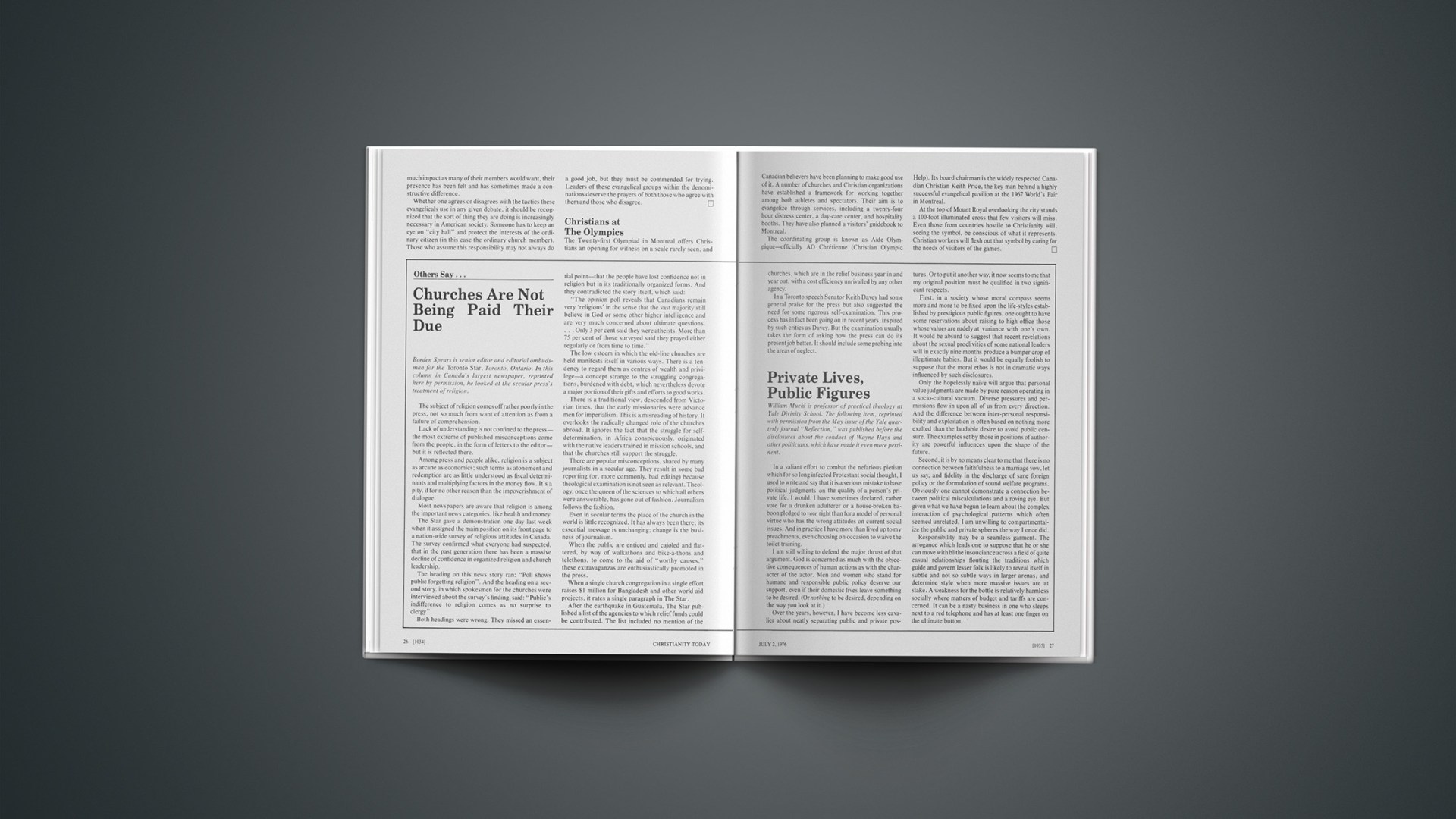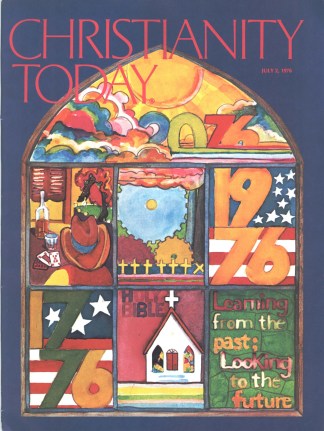Borden Spears is senior editor and editorial ombudsman for the Toronto Star, Toronto, Ontario. In this column in Canada’s largest newspaper, reprinted here by permission, he looked at the secular press’s treatment of religion.
The subject of religion comes off rather poorly in the press, not so much from want of attention as from a failure of comprehension.
Lack of understanding is not confined to the press—the most extreme of published misconceptions come from the people, in the form of letters to the editor—but it is reflected there.
Among press and people alike, religion is a subject as arcane as economics; such terms as atonement and redemption are as little understood as fiscal determinants and multiplying factors in the money flow. It’s a pity, if for no other reason than the impoverishment of dialogue.
Most newspapers are aware that religion is among the important news categories, like health and money.
The Star gave a demonstration one day last week when it assigned the main position on its front page to a nation-wide survey of religious attitudes in Canada. The survey confirmed what everyone had suspected, that in the past generation there has been a massive decline of confidence in organized religion and church leadership.
The heading on this news story ran: “Poll shows public forgetting religion”. And the heading on a second story, in which spokesmen for the churches were interviewed about the survey’s finding, said: “Public’s indifference to religion comes as no surprise to clergy”.
Both headings were wrong. They missed an essential point—that the people have lost confidence not in religion but in its traditionally organized forms. And they contradicted the story itself, which said:
“The opinion poll reveals that Canadians remain very ‘religious’ in the sense that the vast majority still believe in God or some other higher intelligence and are very much concerned about ultimate questions.… Only 3 per cent said they were atheists. More than 75 per cent of those surveyed said they prayed either regularly or from time to time.”
The low esteem in which the old-line churches are held manifests itself in various ways. There is a tendency to regard them as centres of wealth and privilege—a concept strange to the struggling congregations, burdened with debt, which nevertheless devote a major portion of their gifts and efforts to good works.
There is a traditional view, descended from Victorian times, that the early missionaries were advance men for imperialism. This is a misreading of history. It overlooks the radically changed role of the churches abroad. It ignores the fact that the struggle for self-determination, in Africa conspicuously, originated with the native leaders trained in mission schools, and that the churches still support the struggle.
There are popular misconceptions, shared by many journalists in a secular age. They result in some bad reporting (or, more commonly, bad editing) because theological examination is not seen as relevant. Theology, once the queen of the sciences to which all others were answerable, has gone out of fashion. Journalism follows the fashion.
Even in secular terms the place of the church in the world is little recognized. It has always been there; its essential message is unchanging; change is the business of journalism.
When the public are enticed and cajoled and flattered, by way of walkathons and bike-a-thons and telethons, to come to the aid of “worthy causes,” these extravaganzas are enthusiastically promoted in the press.
When a single church congregation in a single effort raises $1 million for Bangladesh and other world aid projects, it rates a single paragraph in The Star.
After the earthquake in Guatemala, The Star published a list of the agencies to which relief funds could be contributed. The list included no mention of the churches, which are in the relief business year in and year out, with a cost efficiency unrivalled by any other agency.
In a Toronto speech Senator Keith Davey had some general praise for the press but also suggested the need for some rigorous self-examination. This process has in fact been going on in recent years, inspired by such critics as Davey. But the examination usually takes the form of asking how the press can do its present job better. It should include some probing into the areas of neglect.
Private Lives, Public Figures
William Muehl is professor of practical theology at Yale Divinity School. The following item, reprinted with permission from the May issue of the Yale quarterly journal“Reflection,” was published before the disclosures about the conduct of Wayne Hays and other politicians, which have made it even more pertinent.
In a valiant effort to combat the nefarious pietism which for so long infected Protestant social thought, I used to write and say that it is a serious mistake to base political judgments on the quality of a person’s private life. I would, I have sometimes declared, rather vote for a drunken adulterer or a house-broken baboon pledged to vote right than for a model of personal virtue who has the wrong attitudes on current social issues. And in practice I have more than lived up to my preachments, even choosing on occasion to waive the toilet training.
I am still willing to defend the major thrust of that argument. God is concerned as much with the objective consequences of human actions as with the character of the actor. Men and women who stand for humane and responsible public policy deserve our support, even if their domestic lives leave something to be desired. (Or nothing to be desired, depending on the way you look at it.)
Over the years, however, I have become less cavalier about neatly separating public and private postures. Or to put it another way, it now seems to me that my original position must be qualified in two significant respects.
First, in a society whose moral compass seems more and more to be fixed upon the life-styles established by prestigious public figures, one ought to have some reservations about raising to high office those whose values are rudely at variance with one’s own. It would be absurd to suggest that recent revelations about the sexual proclivities of some national leaders will in exactly nine months produce a bumper crop of illegitimate babies. But it would be equally foolish to suppose that the moral ethos is not in dramatic ways influenced by such disclosures.
Only the hopelessly naive will argue that personal value judgments are made by pure reason operating in a socio-cultural vacuum. Diverse pressures and permissions flow in upon all of us from every direction. And the difference between inter-personal responsibility and exploitation is often based on nothing more exalted than the laudable desire to avoid public censure. The examples set by those in positions of authority are powerful influences upon the shape of the future.
Second, it is by no means clear to me that there is no connection between faithfulness to a marriage vow, let us say, and fidelity in the discharge of sane foreign policy or the formulation of sound welfare programs. Obviously one cannot demonstrate a connection between political miscalculations and a roving eye. But given what we have begun to learn about the complex interaction of psychological patterns which often seemed unrelated, I am unwilling to compartmentalize the public and private spheres the way I once did.
Responsibility may be a seamless garment. The arrogance which leads one to suppose that he or she can move with blithe insouciance across a field of quite casual relationships flouting the traditions which guide and govern lesser folk is likely to reveal itself in subtle and not so subtle ways in larger arenas, and determine style when more massive issues are at stake. A weakness for the bottle is relatively harmless socially where matters of budget and tariffs are concerned. It can be a nasty business in one who sleeps next to a red telephone and has at least one finger on the ultimate button.










